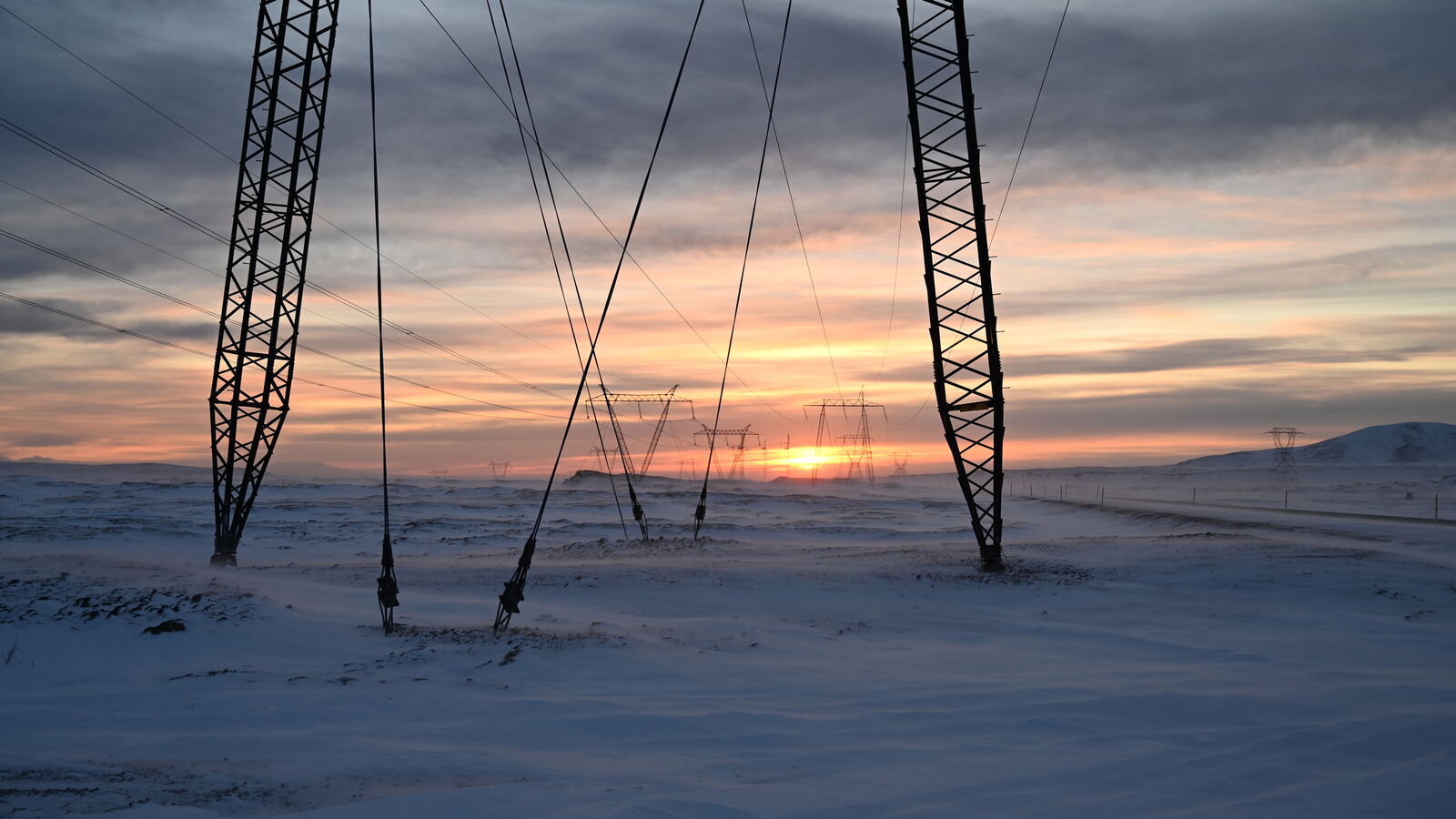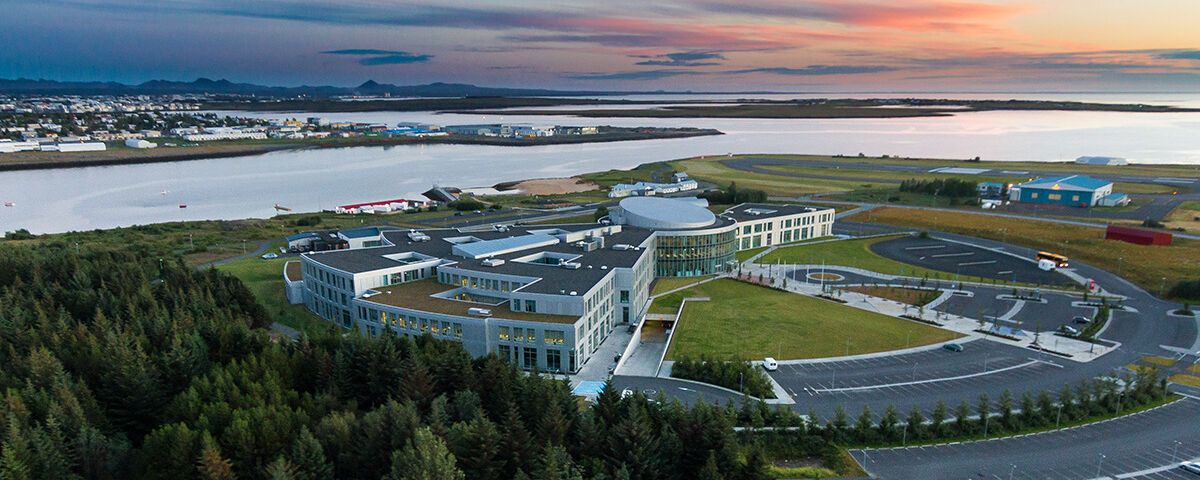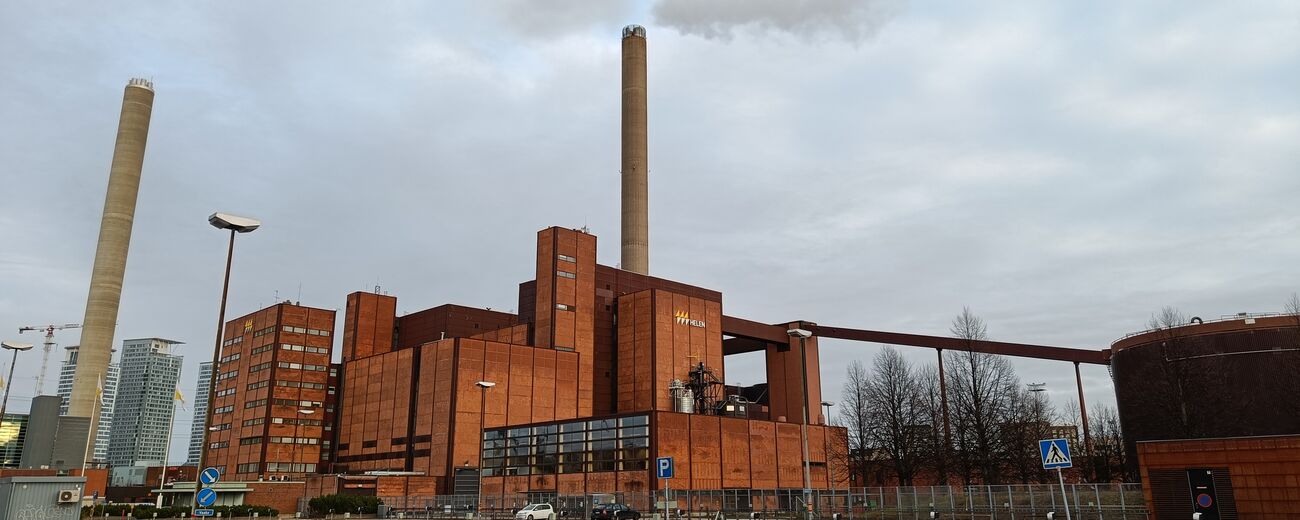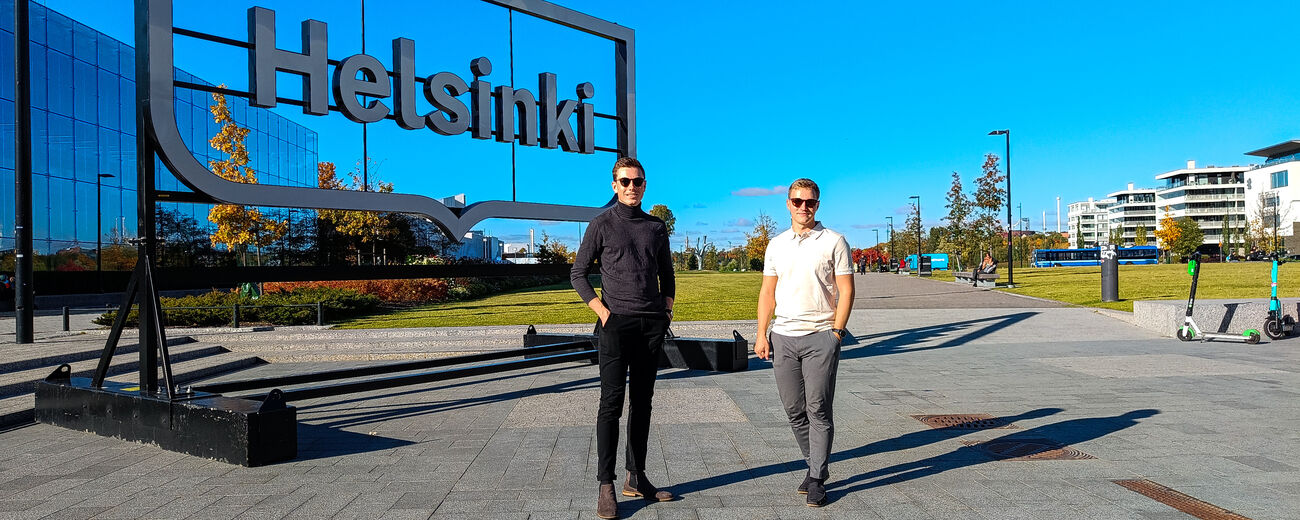Double Degree Aalto University
MSc Electric Power Engineering & MSc Automation and Electrical Engineering
The double degree with Reykjavik University and Aalto University is the perfect program for electrical engineers looking to specialize in power systems and automation. This degree is packed with hands-on experience, fieldwork, and cross-cultural collaboration. It brings together economics, technology, and engineering science into one comprehensive program.
Overview

Language of Instruction: English
Start Date: late July / early August
We are proud to offer a double degree program in partnership with Aalto University. Our 24-month program is designed to push students to complete 120 ECTS. In the first year, students will study at Reykjavik University, and in the second year, they will spend one or two semesters at Aalto University.
Our program focuses on developing the next generation of energy leaders in electric power and energy engineering. By studying at two leading institutions, students will gain a comprehensive and well-rounded education in this cutting-edge field. Plus, they'll receive personalized support from an academic supervisor to help create the perfect study plan.
Ensuring access to a clean, reliable, and cost-effective energy system is one of the foremost challenges of the coming decades. Transitioning from traditional, fossil fuel-dominated energy systems to modern, renewable systems will require a substantial rethinking of how we deliver energy products to consumers. From storage to smart-grid technology, the implementation of these new systems stands on the cutting edge of energy research and is of critical importance in the development of sustainable energy systems.
Our program offers a diverse range of subjects, allowing students to expand their knowledge and expertise in the electric power field. In addition, studying and living in two different countries will provide opportunities to develop crucial cross-cultural communication and collaboration skills.
With a unique and prestigious qualification, our double degree program enhances employability and increases eligibility for international job opportunities. Join us on the forefront of energy research and make a real impact on the future of sustainable energy systems. This is a challenging program that will push you to become an expert in power systems and automation.
Reykjavik University

Reykjavik University's Iceland School of Energy offers a double degree program for electrical engineers looking to specialize in power systems and automation. This program combines economics, technology, engineering and science to provide a comprehensive education in the field of power systems, with a focus on hands-on experience and fieldwork.
The curriculum covers various components of power systems, their physical properties, and design, along with the study of both nominal and perturbed operating conditions. Additionally, the program places emphasis on emerging technologies and their integration into new and existing power systems. The program also offers a personal study plan program that allows students to tailor their course of study to their individual interests and goals.
As part of the program, students will spend the first year at ISE and then move to Aalto for the second year to continue their studies. This program provides students with the knowledge and skills necessary to excel in the power systems engineering industry. Join us at the Iceland School of Energy and take the first step towards a rewarding career in power systems engineering.
Curriculum
The program covers various components of power systems, their physical properties, and design, along with the study of both nominal and perturbed operating conditions. The curriculum places emphasis on emerging technologies and their integration into new and existing power systems, ensuring graduates are prepared to tackle the challenges of this rapidly evolving industry.
Faculty and Resources
Our faculty consists of experienced professors and leading experts from the industry, providing students with the latest insights and expertise. Reykjavik University has a partnership with Landsnet , the Icelandic Transmission Service Operator, which provides students with unparalleled access to data and experts in the field of renewable energy.
Personalized Study Plan
We offer a personal study plan program that allows students to tailor their course of study to their individual interests and goals. This approach prepares them for a final research project, where they can put their newfound knowledge and skills into practice and allows them to focus on their passions and areas of expertise.
Student Body and Faculty
The Iceland School of Energy (ISE) provides a diverse and interdisciplinary education that helps foster students to become entrepreneurs, engineers, managers, policymakers, and researchers. Our student body is composed of individuals from various backgrounds and locations, fostering a collaborative and dynamic learning environment. At ISE, the diverse perspectives and experiences of our students are a key strength and integral to our approach to problem-solving.
International Experience
As part of the double degree program, students have the opportunity to spend a semester studying at Aalto University in Finland. This international experience allows students to expand their cultural and academic horizons, and also have the opportunity to complete their thesis at Aalto or Reykjavik University based on their preference.
Aalto University
Programme Overview
Aalto University is among the top-ranked universities in the world related to industry collaboration. Finland's excellent reputation in education, combined with a wide range of courses offered in English, makes Finland and Aalto University an attractive study destination for international students.
Automation and Electrical Engineering | Aalto University
Electrical power and energy systems form the backbone of societies. Intelligent systems, spanning from production to end-user, ensure optimal utilization of resources — minimal impact on the environment, and maximal benefits for society. This major offers a firm theoretical base as well as practical tools and skills needed by engineers working in the field of electrical power and energy engineering. The field includes transmission, distribution, smart grid, and sustainable generation and utilization of electrical power, as well as power-conversion devices such as motors, generators, and power-electronic converters. In order to prepare students for understanding complex and multidisciplinary problems of the field, the major is designed to be flexible and a systems perspective is emphasized.

Courses
Courses include theoretical considerations, experimental work, industrial applications, and first-hand experience in real research environments.

Learning Outcomes
While the underlying scientific theories and fundamentals remain relatively stable over time, their applications for modern use cases might change rapidly. The programme equips students with the ability to apply scientific methods and theories to the most recent and needed use cases. The Master's Programme in Automation and Electrical Engineering graduates have:
- State-of-the-art knowledge in their field. Graduates have an extensive understanding of the fundamental scientific theories in their chosen area of expertise.
- A solution-based mindset. Graduates are experts in solving real-life problems and shaping industry standards by applying their specific and system-level knowledge.
- An analytical toolbox. Graduates are data-driven and perform well in analytical problem-solving and advanced mathematics, including artificial intelligence and machine learning methods.
- Strong leadership skills. Graduates have great teamwork skills, can handle even the most stressful situations, and lead by example under pressure.
- International competence. Graduates possess professional language skills and the ability to work in a global and multidisciplinary setting.
The Electrical Power and Energy Engineering major offers a firm base for engineers working in the field of electrical power and energy engineering. The field includes power transmission, distribution, smart grid, and sustainable generation and utilization of electrical power, as well as power-conversion devices such as motors, generators, and power electronic converters and their control. Upon completion of the Major, students are able to:
- Identify fundamental aspects and considerations for electrical energy systems
- Develop applications for energy efficiency, integration of renewables, and distributed generation
- Analyse and evaluate existing and future challenges in the field of electrical power and energy engineering
- Design and analyse power systems or energy conversion devices
- Understand one of the focus areas
in-depth: electric powertrains, energy storage and hydrogen, power and energy
systems, renewable energy, smart buildings, and lighting.
At Aalto University, students will have access to state-of-the-art facilities and equipment, as well as opportunities for real-world experience through industry collaborations and research projects. The curriculum is designed to provide a comprehensive and well-rounded education in this cutting-edge field. You can find more information about the curriculum, including specific course offerings, at Aalto University's website here: Curriculum 2022-2024
Structure
The double degree in Electric Power Engineering & MSc Science (Technology) requires 24 months of continuous study and the completion of 120 ECTS. Students complete their first year at their home university. Students complete one or two semesters of study at the partner university in the second year. A personalized study plan is developed for each student with the assistance of an academic supervisor.
Teaching and Learning
Courses are based at the Reykjavik University campus for the first year and the second year is completed at Aalto University's campus in Helsinki, Finland. The curriculum is delivered through a combination of lectures, seminars, laboratory work, and visits. The faculty is made up of professors and leading experts from the industry.
Course Requirements
Mandatory Courses - 42 ECTS
- Power Systems Simulation (6 ECTS) - T-403-RAFO
- Power Systems Operation (8 ECTS) - T-867-POSY
- Stability & Control in Power Systems (8 ECTS) - T-867-STAB
- High Voltage Engineering (8 ECTS) - T-866-HIVO
- Data Mining & Machine Learning (8 ECTS) - T-809-DATA
- Research Methods (4 ECTS) - T-801-RESM
Suggested Electives
- Energy Field School (6 ECTS) - SE-801-ES1
- Smart Grid and Sustainable Power Systems (8 ECTS) - T-867-GRID
- Power Electronics (8 ECTS) - T-866-POEL
- Energy Economics (6 ECTS) - SE-805-EC1
- Energy Markets (6 ECTS) - SE-834-EM2
Sample Schedule
Course offerings may vary from year to year. Accepted students are supported in creating a personalised study plan in meeting the degree requirements.
| Summer | Autumn | Spring | |
|---|---|---|---|
| Year 1 Reykjavik University |
6 ECTS
|
28 ECTS
|
28 ECTS
|
| Year 2 Aalto University |
30 ECTS
|
30 ECTS
|
Sample Courses Descriptions
Energy Field School (6 ECTS)
A three-week, intensive course that provides students with an overview of power systems engineering, the main issues that require a change in the transmission and distribution of electricity, and the factors that may impede or promote meeting that demand. The course is delivered through a combination of lectures and site visits, and students have the opportunity to see working systems that utilize sustainable energy. The course is taught as a summer school, is also open to other participants, and offers a unique introduction to the master's program.
Power Systems Operation (8 ECTS)
12-week course designed to provide students with a working knowledge of power system problems in both balanced and unbalanced operation situation including faults, protection principles, energy management methods, and computer techniques used to solve some of these problems. The transmission line transient operation and insulation coordination is also part of the course.
Topics include: Symmetrical components, Modelling of transformers, lines, and cables in the positive, negative, and zero sequences based on physical models, The impact of different earthing principles, Methods for power system analysis in steady state operation and during grid faults, Faulty system operation, balanced and unbalanced faults, Symmetrical components and unbalanced fault analysis, Basic protective methods and principles, Load flow calculations in steady-state power system analysis, Model complex power system operation issues for economic and secure operation, Load flow calculations in steady-state power system analysis, Model complex power system operation issues for economic and secure operation, Principles for regular power flow and optimal power flow methods, Power system operation principles and basic functions in energy management system. Optimization techniques to solve fundamental operation problems, N -1 steady state contingency analysis, Transmission lines Transient operation, Insulation coordination, Power system state estimation, and the incorporation with phasor measurement units; (Smart Grids). Practical assignments are solved in the numerical simulation program Power World.
High Voltage Engineering (8 ECTS)
12-week course aimed at giving students a basic vision of existing methods and tools relevant to the design and analysis of high voltage (HV) components and insulators.
Key topics covered: electrical field characteristics, numerical computing of voltage distributions and electric fields using Finite-Difference codes, numerical solving Laplace Equation, numerical analysis of E-fields using CST EM Studio, generation of DC, AC, and impulse high-voltages, measurement of DC, AC and impulse high-voltages, breakdown in gases, liquids, and solid dielectrics, application of insulating materials in electrical components, design of insulators, and overvoltage phenomenon.
Power Electronics (8 ECTS)
12-week introduction to power electronics and electronic switches.
Key topics covered: power computations for AC waveforms, DC-DC converters; the buck converter, the boost converter, and non-ideal switches and converter performance, DC Power Supplies; the fly-back converter, the forward converter, and full-bridge and half-bridge DC-DC converters, DC-AC inverters; full and half-bridge converters, pulse-width-modulated output, and three-phase inverters, AC-DC rectifiers; half-wave, controlled half-wave, full-wave, single-phase, full-wave, controlled and three-phase, AC voltage controllers; single-phase and three-phase, resonant converters, and drive circuits, snubber circuits, and heat sinks.
Energy Economics (6 ECTS)
12-week course focusing on the specifics of energy economics, giving students a broad overview of a variety of theoretical and empirical topics related to energy economics.
Main learning objectives: Understanding these topics related to energy economics, applying methods from mathematics and economics science in order to analyze complex systems in energy systems, analyzing the economics of an energy project, analyzing and communicating data, and developing analytical solutions to a range of practical problems.
Data Mining and Machine Learning (8 ECTS)
12-week introductory course.
Main learning objectives: Apply the data mining methods and implement the machine learning algorithms presented in the course using standard programming languages such as Python or Matlab and software packages, design a suitable machine learning algorithm for a real-world problem, evaluate its performance, compare different designs and implementations and interpret the results, and present findings and new results in the subject.
Smart Grid and Sustainable Power Systems (8 ECTS)
12-week introduction to electric power systems and smart grids.
Key topics covered: energy resources and power plants, smart grids control and automation, information and communications technologies (ICT) applications for smart grids, renewable energy and emerging technologies, stability analysis for smart grids, power electronics and high voltage direct current (HVDC) transmission in smart grids, and case-studies, experiences, test cases, or a project in smart grids.
Research Methods (4 ECTS)
Industry and society need people who can think critically, who can analyse complex situations and who can communicate their findings effectively. This can involve many tasks, including searching for and evaluating the worth of scientific literature and other forms of documentation. In this course, we concentrate on scientific writing and reporting, survey techniques, and presentations. It will prepare students for dealing with the information gathering, analysis, and reporting skills that are required for all other courses.
Key topics covered: Literature surveys, search engines, and other agencies, scientific writing, academic publishing, thesis writing, reviewing papers, and managing a research project.
Stability and Control in Power Systems (8 ECTS)
12-week course designed to help obtain knowledge about conditions in electric power systems that can lead to stability problems, to understand which physical mechanisms are the cause of power system instability, and to give the student insight into the theoretical background for analysis methods used for assessment of system stability.
Hands-on experience will be obtained by carrying out numerical simulations and analysis in MatLab/Python, where students analyse different stability problems by implementing and applying appropriate models and methods for analysis.
Main learning objectives: explain the principal causes of power system stability problems (frequency, transient rotor angle, small-signal rotor angle, and voltage stability problems), reflect on how power system stability problems are affected by grid-related limitations for the transfer of active power and the machine-related limitation for the injection of active and reactive power.
Elective Modules
Students have access to a wide variety of elective module to tailor their curriculum to suit their focus. Elective courses include but are not limited to:
- Partial Differential Equations
- Data-mining and Machine Learning
- Simulation
- Advanced Circuit Design
- Theory of Computation
- Measurements and Stochastic Variables
- Linear Dynamical Systems
- Energy Economics
- Energy Markets
- International and European Energy Law
- Probability and Stochastic Processes
- Engineering Optimization
>> More information on all available courses can be obtained from the course overview page.
Admissions
The RU-Aalto double degree program is open for students formally admitted to RU's Electric Power Engineering Programme. There is no method to apply directly for admission to the double degree program. After completing the first semester of studies (30 ECTS), students can apply to the double degree programme starting in the fall of their third semester.
To graduate with a master's degree in engineering and become a chartered engineer in Iceland, students must fulfill the requirements set forth by the Ministry of Industries and Innovation. See here for more information.
Requirements for Admission to Aalto
Students must satisfy the requirements of admission to RU's Electric Power Engineering Programme. In addition, students must provide the following:
- A one-page letter of intent for the double degree
- Transcripts for the first year of courses completed/taken part in at RU
- An average GPA of 8/10 at the graduate level is recommended
Tuition
Students pay tuition and other fees to their home institution during the exchange period. More information about tuition and fees for Reykjavik University can be found here: Tuition Fees
Contact us
Have a question about the double degree programme between Reykjavík University and Aalto University? Reach out to us and let's discuss the possibilities.
Reykjavík University

Mohamed F. M. Abdelfattah
Program Director

Jacob Kaminski
Program Administrator
Freyja Ingadóttir
International Admissions Officer
Aalto University

Matti Lehtonen
Program Director

Alli Palojarvi
Planning Officer
Students may reach out for questions regarding registration, application, schedules, and other inquires
